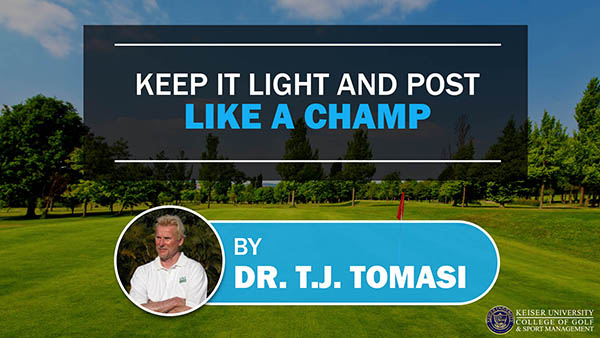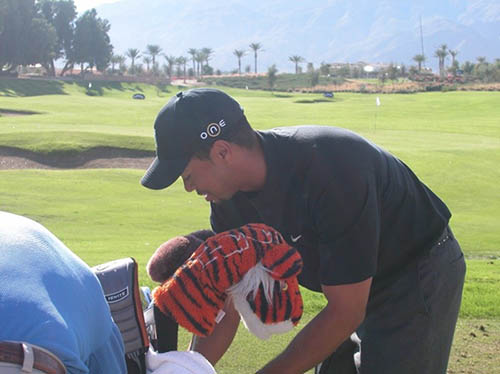Keep it Light and Post Like a Champ

By Dr. T. J. Tomasi, Keiser University College of Golf Senior Faculty and Director of Research
Golf is a stress-filled game, and to be a good player, you need to understand how to deal with yourself when stress levels rise. Talking trash to yourself will only make things worse because as the stress takes control, anti-golf chemicals flood your body, making it impossible for you to play your best golf. To take back control, you need to understand the physical damage stress can do to your game – and it all starts with your self-talk.
Ban Negative-Talk
Certain words can damage both the speaker’s and the listener’s brain — so say Mark Waldman and Dr. Andrew Newberg, in the book “Words Can Change Your Brain.”
“If I were to put you into an fMRI scanner — a huge donut-shaped magnet that can take a video of the neural changes happening in your brain — and flash the word “NO” for less than one second, you’d see a sudden release of dozens of stress-producing hormones and neurotransmitters,” says Dr. Newberg. “These chemicals immediately interrupt the normal functioning of your brain, impairing logic, reason, language processing, and communication.”
Now think for a moment about the way you talk to yourself while you’re playing lousy golf. Not exactly therapeutic, is it? Your negative self-talk is condescending, destructive, overcritical, the-glass-is-half-empty type of talk filled with NO’s that can destroy your game. Science says, if you can’t say something nice to yourself, don’t say anything because words have chemicals as their consequence – and it’s the same with laughter.

Tiger as a young player (~8 years old), had a favorite head-cover he named Frank, which he talked to when things got tough on the course, and he’s maintained the relationship all the way to the PGA Tour.
Laugh It Up
“Laughter triggers endorphin activation,” says Robin Dunbar, an evolutionary psychologist at Oxford University. Endorphins are the body’s ‘happy chemicals.’ It’s not the intellectual pleasure of humor but the physical act of laughing itself — i.e., the muscular contractions involved in producing the laugh — that triggers an increase in our feel-good brain chemicals. Muscle contractions have chemicals as their consequence.
So, what about golf and laughing? I admit I’m no Seinfeld, but as an instructor, I have seen humor work to assuage golf failures. Humans love to laugh — the average adult laughs 17 times a day — so a hearty ho-ho can lighten the stress load when things go sideways on the golf course.
Fake It Until You Make It
But of all the interventions that defuse stress, the ultimate is “high power posing,” or in my terms, “fake it till you make it!” Here, instead of folding up and getting small under stress, you use your posture to make yourself big. It’s an intervention used not only by humans but by other animals, as anyone who has seen a cat “bush up” under threat understands. High-power posing posits an intimate connection between how we posture our bodies and the thoughts/emotions in our brains. It is common knowledge that when you feel powerful, your posture reflects it. Assume a powerful pose, and by virtue of that pose, you become powerful. But the opposite is also true – slump your shoulders and drop your chin toward your chest, and you become weak.
How does your posture affect your perception? Science says that your physical body posture triggers the production of certain chemicals that take advantage of stress. Research by Dr. Amy Cuddy of Harvard University shows a direct link between stress hormone levels and body posture. The subjects she trained to high-power pose showed a 20 percent increase in testosterone (the fight/flight chemical), while those who reacted to stress with low-power poses showed a drop in blood testosterone levels of 10 percent.
High-power poses include anything that makes you appear larger and/or relates to expanding your control of the space around you. Your body expands outward and upward, head high, chin up, hands-on-hips or arms folded with elbows out, shoulders back, chest thrust out, feet spread — anything you can do to make yourself look bigger. Posture has chemicals as its consequence.
Takeaway: Woven into the fabric of golf is stress — some is good stress (eustress), where the butterflies in your stomach are flying in formation, and some is bad stress (distress), where the butterflies are dive-bombing. How well you play is directly related to how well you control stress using self-interventions such as the ones I’ve outlined above. It is my advice to my students to devote entire rounds of golf to controlling self-talk, posture, etc., because ball control starts with self-control.
If you’d like to study with Dr. Tomasi and other PGA Master Professionals, contact The College of Golf today.














